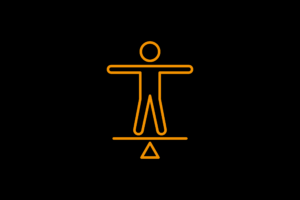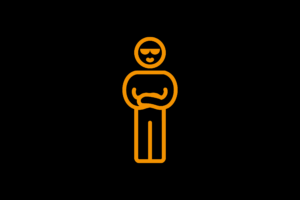Autistic people often have lower sensitivity OR higher sensitivity with balance. It is common for the levels of sensitivity to change according to how relaxed, stressed or tired the person is feeling.
The scientific name for our sense of balance is the Vestibular System.
Our sense of balance is important for understanding the speed and direction of our movement. Have you ever counted how many times you can spin around before you feel dizzy? Some people get dizzy really quickly, whilst others can spin lots of times and then still be able to walk in a straight line without wobbling afterwards.
Lower sensitivity
People with a lower sensitivity usually love to move, swing, rock and spin. Fairground rides tend to be great fun, but places where people expect you to sit still can feel quite tough. People with lower sensitivity often need extra movement to help them to concentrate, so might rock or swing in their chair without even realising they are doing it until someone tells them to stop.
TOP TIP – When studying or working at a desk a change of chair or type of seat can be a safe way to get some extra movement. A spinny desk/computer chair will allow you to twist and twirl a little, a gym/yoga ball as a seat will give you a chance to bounce or rock, or placing a wobble cushion on an ordinary chair will provide some extra movement to help with concentration.
Higher sensitivity
When people have higher sensitivity to balance they may prefer to keep their feet firmly on the ground, as it doesn’t take much to make them feel a bit dizzy or sick! They usually prefer gentle, more predictable movements that they are in control of or are able to understand through using other senses to help. If you are someone who gets travel sick on car journeys, you perhaps already know that travelling in the front seat makes you feel better; if you are sat at the front you have a clear view of the road ahead, so your sense of sight helps your sense of balance with understanding and predicting the movement you’re feeling.
TOP TIP – If you are wanting to take part in an activity, but the movement that is needed is difficult, it is great to discuss this with an adult to help set you up for success. It might take time or suggestions from a professional specialising in movement like an Occupational Therapist.



